Well, it happened; two weeks ago, I received my final marks for my MA in Writing Poetry and official confirmation that I will be travelling up to Newcastle to graduate with a Merit. I am, as I posted shamelessly and delightedly to social media, just too pleased and proud about this. I started the MA incredibly naive to what it would involve and how it would change me, a naivety which was further borne out (ha) by the decision to simultaneously embark on having a baby (and sell our flat and change jobs. I’m a trip).
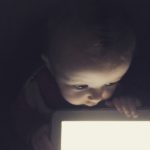
In the end, it was terrifically difficult; my vague notions of how the baby would nap peacefully while I pored over my books and scribbled away were sent scrambling by a series of increasingly dramatic health problems and a kid who scorned sleep. Thi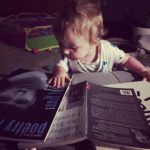 s was further complicated by an increasingly anxious desire to do quite well, actually, thanks all the same (which shouldn’t have taken me by surprise and yet very much did). But thanks to the help of an awful lot of very generous people and very little sleep, I made it, and am thrilled.
s was further complicated by an increasingly anxious desire to do quite well, actually, thanks all the same (which shouldn’t have taken me by surprise and yet very much did). But thanks to the help of an awful lot of very generous people and very little sleep, I made it, and am thrilled.
To celebrate (you lucky ducks), I am sharing here a version of my final portfolio essay, edited slightly for clarity. I submitted with this essay a portfolio of poems, which cannot be shared here as I am diligently sending them off for publication, but hopefully it makes for worthwhile reading even so – and I promise to share more of my writing as soon as, and as often as I can.
At the end of two years of reflection on my poetic practice and the collection of work that this has produced, I find myself echoing the question Claire Kilroy asks, paraphrasing Keats, in her postpartum essay ‘F for Phone’: ‘Why am I writing all this? Because I cannot write anything else. I am lying down where all the ladders start, in the foul rag-and-bone shop of the heart.’[1] My poetic development over the last two years has been dominated by the experience of becoming a mother. I too have often felt unable to write anything else as I tried to build something true and good in the cratered landscape of my new world. Ultimately, I found having a child to be one of the most profoundly creative times in my life; the twin forges of the MA and motherhood have worked hand in hand to refine and push my writing further than ever before and have grown in me the muscle for and compulsion to write that I wasn’t sure I possessed previously.
If someone were to offer to publish my portfolio tomorrow, I would choose the title ‘Emotional Labour’. I have thought about my body of work over the last two years as an increasingly coherent thing, with a unifying theme and something to say, and I want a title that signals that message to the reader. Emotional labour is a topical phrase; culturally, we are increasingly aware of the emotional loads that women bear. The phrase was coined by sociologist Arlie Hochschild to describe the under-valued and underpaid emotional work required by those in the service economy, in roles that are traditionally held primarily by women. As the concept has gained traction in popular culture, it has become synonymous with the emotional work that women carry out in the domestic sphere to show love, to care for children and partners and to shoulder unequal responsibility for maintaining the social and logistical bonds that knit families together. Increasingly, feminist theorists argue that the sum of this ongoing emotional management is yet another form of unpaid labor. Rose Hackman in the Guardian described it as ‘the woman as the emotion manager, throw[n] into…a “second shift”’[2] at home. While this chimes with my experience in some ways, in others it would be conceptually dishonest of me not to credit the egalitarian support that went into completing an MA under these sorts of pressures. My husband has taken on an equal or greater share of the childcare throughout but in particular in support of my writing, alongside unpaid childcare provided by my mother and in-laws. Without these contributions, I would never have had the time, space and mental resources to continue with the MA and the work I created throughout would not exist. My work is not just an account of my own emotional labour, it is the product of the emotional labour of others. Its guiding principle is in the very bones of it, in its scaffolding, and because of that, I felt enabled to explore complicated feelings about myself as a woman and as a mother in a world that that does not routinely empower women with young children to do such exploring.
As a feminist who works hard to live her principles in the personal and professional spheres, I was already fascinated by the links between public and private emotional labour and how this would come to bear on my daughter and me. What took me by surprise was how my traumatic birthing experience and our illnesses affected my perceptions of the emotional labour involved in female pain, particularly in pregnancy and childbirth. I believe my experience, and that of many women, was worse than it could have been; there is honesty in the hard work of birth but it need not be frightening, lonely or cruel, and yet for me and too many women it is. In her essay on female pain, Leslie Jamison quotes Menander thus; “’Woman is a pain that never goes away’” and explores the possibility that:
…being a woman requires being in pain, that pain is the unending glue and prerequisite of female consciousness…Wounds promise authenticity and profundity…They bleed enough light to write by. They yield scars full of stories and slights that become rallying cries.[3]
If as women who choose motherhood, we are placed in the position of having to endure the pain of childmaking, emotional and otherwise, then I am heartened by the argument that discussing and performing that pain through my poetry has created something valuable and beautiful. Pain is certainly not the only emotion that I have sought to process through my writing, but I believe the catalyzing force that the difficulty and discomfort of my pregnancy and labour produced was essential to developing my writing.
All along, I have wanted to write poems that spoke powerfully about my profound and profoundly new experiences of the past two years. I also wanted to talk, through my work and the critical reflections written for this MA, about the experiences of all mothers that seem find such limited voice in the canon. I am not alone in exploring this subject; from Alicia Ostriker in ‘A Wild Surmise: Motherhood and Poetry’ in 1983[4] to Carolyn Jess-Cooke in Writing Motherhood: A Creative Anthology in 2017, women writers have been asking: why is it that mother-writers have such a challenge being heard, recognized and published? Jess-Cooke cites discomfiting numbers to support this based on analysis of books reviewed in the Times Literary Supplement: 313 books by female authors and 907 by male authors.[5] The problem is a real one, and it is not lost on me that as I seek publication for these poems, it may well have a limiting effect. This is not to say that there are no women writing or that the subject of motherhood is unexplored; I have been inspired by particularly by the work of mother-poets from Sylvia Plath to Clare Pollard (who I was so lucky to have as my tutor) and Sally Read, via Toi Derricotte and Sharon Olds. But writing on motherhood is poorly advertised, for an experience no less universal than love, sex, death or nature. In fact, it uniquely combines all these things at its very heart. I hunted mother-poets out assiduously in libraries, anthologies and online, and begged recommendations from any poet I met. When I met women writers (with particular credit to Siriol Troup and Tamar Yoseloff, who I find tremendously inspiring), I was hungry for their experiences and owe them a debt. These poets were my compasses in the unknown land of writing about motherhood, and in becoming a mother who wished to write. I found Toi Derricotte’s Natural Birth profoundly compelling, her slim epic prose-verse composite documenting the birth of her son decades before. I wanted to attempt exactly what she had set out to do before me:
…by showing one woman’s experience, which so diverged from the ideal, and yet which, in the end…hold[s] on to the mystery and power of the ideal of that singular rite of passage…I wanted to imply that all creative acts, whether it is giving birth to a child, a work of art, or the self, are unique and arduous and awe-full.[6]
Since my body of work largely grew, was shaped and created concurrent with my daughter, this mission statement of Derricotte’s resonated powerfully with me. I wanted to write poems with an additional agenda beyond evoking my personal experience as powerfully as possible; I also wanted to add to a limited conversation about female pain, the work of making and looking after children and the place that pregnancy and pregnant women occupy in our culture, as well as write about the curious sensation of having my most intimate physical experiences broadcast to the world and yet feeling compelled to share those experiences through my writing. Sharing through my writing is a kind of performance I felt I had more control over than my body and was therefore more personally empowering. Poems such as Sharon Olds’ ‘Language of the Brag’ and Liz Berry’s ‘The Republic of Motherhood’ are two excellent examples of what I am trying to do with my writing. They are statements about the power and profundity of making a human and all that entails; ‘Language of the Brag’ takes childbirth and places it squarely where it belongs as a central human achievement and a worthy subject for a poem:
…I have done this thing,
I and the other women this exceptional
act with the exceptional heroic body,
this giving birth, this glistening verb,
and I am putting my proud American boast
right here with the others.[7]
It is the raw thumb-biting boldness of this poem that has inspired me, the way it grabs for itself the enduring themes of American exceptionalism and the naked ambition of calling out her male predecessors. I also seek to position the physical act of pregnancy and birth, or even of simply being a woman in a woman’s body, as a worthy subject for poetry. Berry’s poem is a flaming telegram from a new land, ‘I wanted to speak to them, tell them I understood,/but the words came out scrambled…’[8]. There can be no simpler summary of what I have spent a year trying to do with my writing than these words.
My work over the last two years is my own attempt at a kind of unscrambling. Anne Sexton’s ‘Double Image’, written after a separation from her daughter following her suicide attempt and hospitalization, evokes for me my tenderest feelings for my daughter, ‘my splendid/stranger/…a girl, already loved, already loud in the house/of herself…I made you to find me.’[9] In some of my darkest times, I wrote poems that helped me to discover, through the fog of our first days, how I felt for the beloved and feral creatures I had created, both child and poems. I earned her, I earned the love that made her and I invested those earnings into the emotional labour that produced this collection of poems. My recent work is, on the surface, an ode to my girl, but it is also a complicated gift to myself. I made her and I made it and through doing have made something truer and stronger of my own self, as a mother and a woman and a writer.
[1] Claire Kilroy, ‘F for Phone’, Winter Papers, Vol. 1, (Ireland: Curlew Editions, 2015)
[2] Rose Hackman, ‘”Women are just better at this stuff”: Is emotional labour feminism’s next frontier?’, The Guardian, 8 November 2015
[3] Leslie Jamison, ‘Grand Unified Theory of Female Pain’ from The Virginia Quarterly Review, Spring 2014 (Center for Media and Citizenship at the University of Virginia)
[4] Alicia Ostriker, ‘A Wild Surmise: Motherhood and Poetry’ in Writing Like A Woman (Michigan: University of Michigan Press, 1983), pp. 126-131
[5] Carolyn Jess-Cooke, ‘Introduction’, Writing Motherhood: A Creative Anthology (Bridgend: Seren, 2017) pp9-17
[6] Toi Derricotte, Natural Birth, (Ithaca: Firebrand Books, 2000), p17
[7] Sharon Olds, ‘Language of the Brag’, Satan Says (Pittsburgh: University of Pittsburgh Press, 1980) p44
[8] Liz Berry, ‘The Republic of Motherhood’, Granta 140: State of Mind, The Online Edition, 11 August 2017
[9] Anne Sexton, ‘Double Image’, The Collected Poems, p35
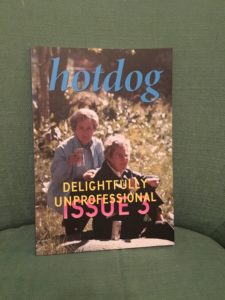 They took one of my older pieces, ‘The Mine’, a poem about surviving darkness. It was first written at a very difficult time, but it represented a return to poetry for me and a few months later it helped push me to start my MA in Writing Poetry. I ended up substantially reworking it for submission with my MA portfolio – where it became something a little different. My portfolio charted the emotional journey and the work that went into becoming and being a mother. This poem now represents a turning point in my emotional life, where I worked with my husband to get better and to deliberately and proactively to build something out of the ashes of my illness, which ended up being my little girl. Of course, it also exists as a reminder that my mental health will always be a part of who I am as a woman and now as a mother. I was so proud to have it published by the powerhouses that edit hotdog, Molly and Megan, and hotdog continues to go from strength to strength (including a stint on display in Somerset House).
They took one of my older pieces, ‘The Mine’, a poem about surviving darkness. It was first written at a very difficult time, but it represented a return to poetry for me and a few months later it helped push me to start my MA in Writing Poetry. I ended up substantially reworking it for submission with my MA portfolio – where it became something a little different. My portfolio charted the emotional journey and the work that went into becoming and being a mother. This poem now represents a turning point in my emotional life, where I worked with my husband to get better and to deliberately and proactively to build something out of the ashes of my illness, which ended up being my little girl. Of course, it also exists as a reminder that my mental health will always be a part of who I am as a woman and now as a mother. I was so proud to have it published by the powerhouses that edit hotdog, Molly and Megan, and hotdog continues to go from strength to strength (including a stint on display in Somerset House).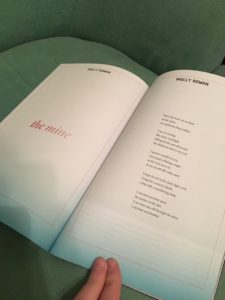

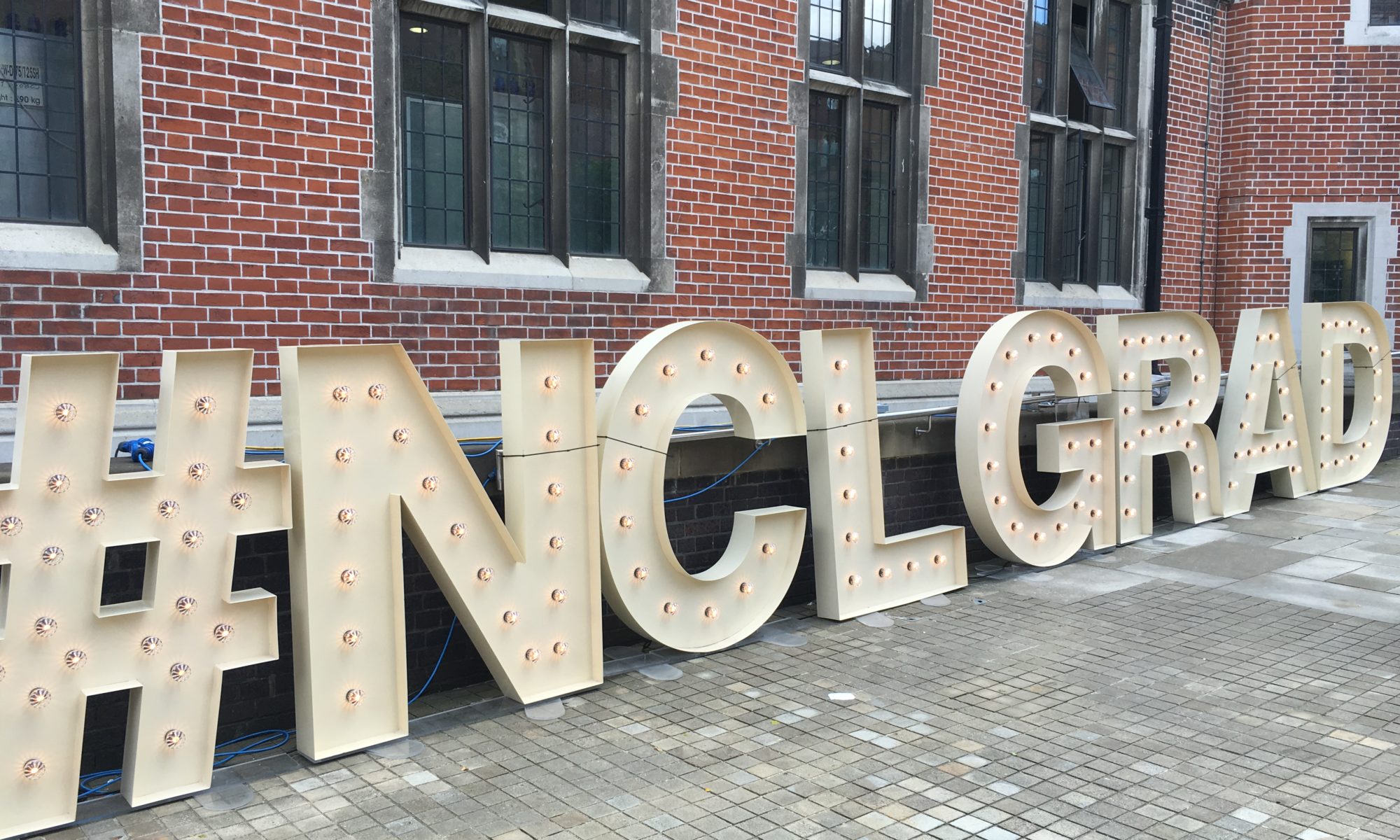

 s was further complicated by an increasingly anxious desire to do quite well, actually, thanks all the same (which shouldn’t have taken me by surprise and yet very much did). But thanks to the help of an awful lot of very generous people and very little sleep, I made it, and am thrilled.
s was further complicated by an increasingly anxious desire to do quite well, actually, thanks all the same (which shouldn’t have taken me by surprise and yet very much did). But thanks to the help of an awful lot of very generous people and very little sleep, I made it, and am thrilled.